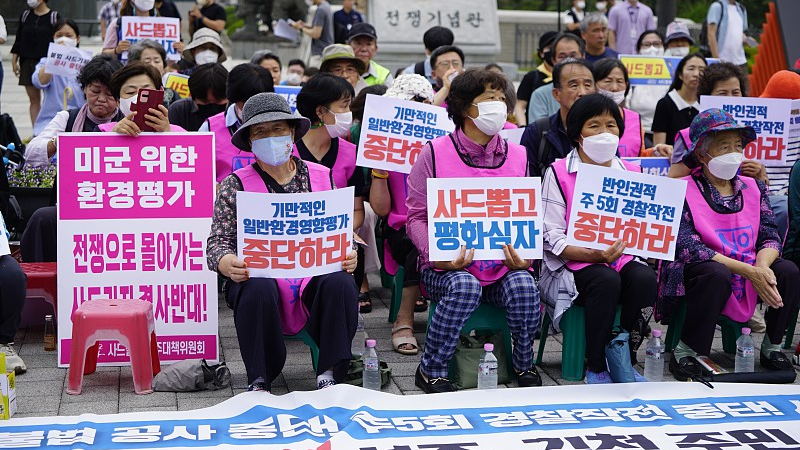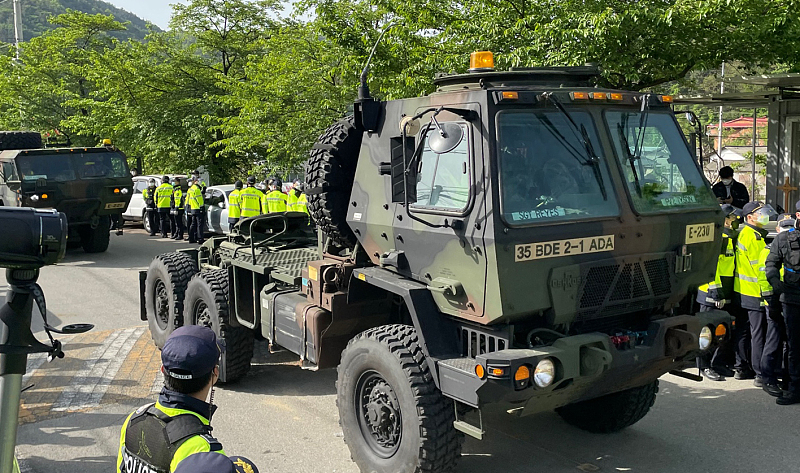
People from the deployment site of the THAAD anti-missile system held a protest rally in front of South Korea's presidential office in Yongsan District, Seoul, South Korea, June 23, 2022. /CFP
People from the deployment site of the THAAD anti-missile system held a protest rally in front of South Korea's presidential office in Yongsan District, Seoul, South Korea, June 23, 2022. /CFP
Editor's note: Hayat Bangash is a freelance columnist on international affairs with degrees in business administration and war studies. The article reflects the author's opinions and not necessarily the views of CGTN.
The U.S. is soon taking over 730,000 square meters of additional territory of Republic of Korea (South Korea) for the deployment of the Terminal High Altitude Area Defense (THAAD) anti-missile defense system. This development became public last week when military officials from the two countries signed a document on the provision of land.
How much South Korea is willing to accommodate the U.S. remains to be seen but such steps are not beneficial for Seoul's relations with regional capitals.
Beijing, for one, values its three-decades-long partnership with Seoul that has come a long way since the days of the Cold War. In the coming years, too, there will be ups and downs; prudently handling them will allow the two to prioritize common interests over the interests of extra-regional entities.
Earlier in August, when Chinese State Councilor and Foreign Minister Wang Yi met with South Korean Foreign Minister Park Jin, they agreed that the THAAD-related issues should not become a hurdle in their countries' ties. China highly regards its relations with South Korea but that does not mean it accepts the deployment of the contentious military system in the region.
Of course, South Korea is free to develop bilateral ties with any country it chooses. At the same time, it should regard the legitimate security concerns of its neighbors. The Moon administration had given a clear-sighted statement in 2017 on the "Three No's" policy, referring to no participation in the U.S. missile defense network, no trilateral military alliance with the U.S. and Japan, and no additional THAAD deployment.
Backtracking on this commitment will not send a good diplomatic message to the neighbors and friends of South Korea.
And doing so at the behest of a capricious ally like the U.S. will further affect the credibility of South Korea's promises. The U.S. unreliability can be gauged from its military interventions in regions far from its own territory. As it sublets its hegemonic machinations to regional players, it plainly stays out of harm's way.
At the same time, the U.S. has had little success in structuralizing exclusive groups in East Asia in the name of security because the region is closely integrated economically where trade links overshadow bloc politics.
Countries of the region have been watching the U.S. abruptly disengage from the Middle East and Afghanistan and abandon its state and sub-state partners often in the dark of night. Even the enemies being fought were, in many cases, created by the U.S. itself.
Any distrust that may arise between South Korea and China will also be created by the U.S. As George Friedman writes in his book "The Next 100 Years: A Forecast for the 21st century," the U.S. prevents stability in areas where another power appears to be rising. Imaginary threats like China thus have to be created.
The simmering tensions in various parts of the world make sure that markets for the American military-industrial complex remain open. When we see America's partners at the forefront of these tensions, an inference becomes unsurprising that the U.S. could be willfully pushing them into conflict for the sale of weapon systems.

The South Korean Defense Ministry and the U.S. Forces Korea (USFK) carry building materials and other materials into the THAAD anti-missile base, South Korea, April 28, 2021. /CFP
The South Korean Defense Ministry and the U.S. Forces Korea (USFK) carry building materials and other materials into the THAAD anti-missile base, South Korea, April 28, 2021. /CFP
Another difficult situation that the U.S. has pushed South Korea into is the Inflation Reduction Act (IRA). The IRA is a bill signed into law by U.S. President Joe Biden giving enormous subsidies to electric vehicles being produced in the U.S. This has, in effect, raised trade barriers for such vehicles made in South Korea, apart from other countries.
The disregard for South Korea's apprehensions over the Act became evident when President Yoon Suk-yeol's office stated last week that the President discussed the IRA with his American counterpart during a meeting in New York. In the readout of the meeting between the two leaders released by the White House, however, there was no mention of Seoul's concerns.
Not only did Biden's mere 48-second-long chat with Yoon at the Global Fund's Seventh Replenishment event not go well with Korean netizens, but Biden's handshake without making eye contact with Yoon at the NATO Summit in June also drew flak on social media.
These incidents clearly indicate that the relationship between the U.S. and South Korea is lopsided. Washington is aggressively peddling defense contracts while degrading economic and diplomatic ties.
On the other hand, the relationship between South Korea and China is that of trust. It has evolved over the years to respect each other's core interests and major concerns. The extensive communication channels between their governments and interactions between their leaders have developed a sense of strong mutual understanding.
It is for this reason that South Korea, despite its engagements with the U.S., maintains close contact with the major regional stakeholder that China is.
There are avenues like the Regional Comprehensive Economic Partnership and China-Japan-South Korea free trade deal that are open to South Korea to make use of without any strings attached. But while pursuing its goals, the country should not disregard the overlapping security and economic objectives that it shares with its neighbors.
(If you want to contribute and have specific expertise, please contact us at opinions@cgtn.com. Follow @thouse_opinions on Twitter to discover the latest commentaries in the CGTN Opinion Section.)

